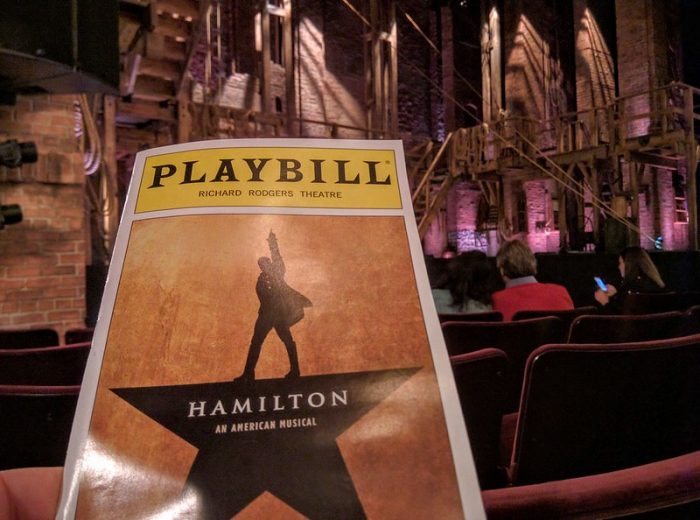It’s the middle of a weekday afternoon.
Everyone in my family is out of the house. I flip through the channels, trying to find something to watch.
No, not the news. Reality TV is a big no for me. And I’ll pass on talk shows or reruns of “Seinfeld” or “Futurama.”
I know. I’ll watch “Hamilton.”
Again.
While I’m watching, I keep one eye on my family’s location to see if they’re on their way home. It’s not that they don’t know how often I watch “Hamilton.” But this is an obsession—an obsession I prefer to keep to myself.
~
I was first exposed to the “Hamilton” soundtrack on a road trip from Minneapolis, Minnesota, to Milwaukee, Wisconsin, with my 15-year-old daughter and her friend.
The two of them sang along to every word (and I mean every word) at full volume the entire way.
I thought the music was innovative and entertaining. I didn’t mind listening to it and was glad the girls had fun. It was a “good mom” moment.
But the songs played in random order, so I couldn’t catch the plot. And some of the songs, like “Guns and Ships,” are so fast, I couldn’t have caught it even if they were played in order. (The entire musical is so fast, in fact, that it would last for 4-6 hours if it were performed at the speed of a typical Broadway show.)
My daughter, however, understood everything. She hadn’t seen the show yet, but she’d studied and memorized the lyrics. She told me that I, a long-time Broadway lover, would finally find a musical that could knock “Wicked” from the top spot.
I doubted it. I mean, every time Elphaba flies into the air on her broom, singing, “No wizard that there ever is or was is ever going to bring me down!” I lose whatever composure I still have by that time in the show.
My daughter and I made plans to see the show live in Chicago. She explained the plot to me on the flight there, for which I was grateful (and recommend for any newbies).
The set was sparse, but the buzzing in the theater was electrifying. And once the show started with only the character of Aaron Burr walking on stage, it never stopped.
“You haven’t cried yet,” my daughter noted at intermission.
“No, I’m doing okay,” I answered, catching my breath.
“Oh, you’ll cry in the second half. Trust me.”
The second half, you might remember, is when Hamilton’s son, in an effort to defend his father’s reputation, dies after a gun duel. He makes it to the hospital, though, where his mother, Eliza Hamilton, rushes to his bedside.
The tears trickled down my cheeks. I heard a few sniffles around me. And then, a man in the row behind me released a choked sob. That was it for me. I don’t let anyone cry alone.
Rolling tears are one thing, but when her son dies in her arms and Eliza screams, I loudly gasp/sob/snort. As a mother, I know that scream. No, I’ve not lost a child. But no mother needs to actually have lost a child to know that scream, to feel that pain. It’s primal, it’s universal—the most earth-shattering human emotion of all.
My daughter squeezed my hand.
From that moment on, “Hamilton” did take the top spot on my musical list.
When it came out on Disney+ last summer, I planned my entire evening around watching it. Since then, I’ve watched it a dozen times more, especially through the summer months of quarantine, where it became a staple of mine.
I’ve been thinking lately about why and how this particular show buried itself so deeply in my heart.
It’s true that there’s no other musical quite like it. It hits every emotional note, so by the time I’ve watched the whole thing, I’ve cried, laughed, and, yes, even sang out loud.
The acting is incredible, bar none. Watching it at home on the screen zooms in on the subtleties of the performances that are easy to miss in the theater. I am astounded that people have that much talent. There’s no other explanation for it—it’s genius.
The show, in my estimation, gives a fairly honest depiction of the true nature of human beings. Most of us come to the show thinking Aaron Burr is a villain. But is he really? By the end of the show, it’s a confusing question to answer.
Throughout the show, human beings are depicted in their brokenness—they’re complicated, jealous, selfish, and greedy. But they’re also depicted in their wholeness. They’re reflective, remorseful, sentimental, and hopeful.
And I loved that the roles, with only a few exceptions, were played by people of color.
But there are problems with the show, historically speaking. Ava DuVernay tweeted this, for instance:
Yep. Bought/owned. Believed in manumission, not abolition. Wrote violent filth about Native people. Believed in only elites holding political power and no term limits. And the banking innovation has troubled roots. That’s why I don’t look to art for my history. I study history. https://t.co/CNnjOWMnyq
— Ava DuVernay (@ava) July 3, 2020
It’s more than a little problematic when the arts are used to reinforce the American myth that this country was founded by people who were forward-thinking, progressive, and fair. It’s not true; our country’s founding fathers owned slaves or married into slave-owning households. And letting white people off the hook via a reframed, cleaned-up take on history is dangerous, especially in light of renewed calls for reparations.
(Please read this article by Charles Blow, entitled Reparations: Reasonable and Right, for an excellent explainer on why reparations are needed.)
So, I think it’s important that when we watch “Hamilton,” we understand that, to some degree, it is a fictionalized and sanitized version of American history.
I know Lin-Manuel Miranda tried to be as accurate as possible about our American history, but he took advantage of his creative license, too. For instance, while Hamilton did support John Lauren’s goal of creating the nation’s first all-black battalion, he did not write pamphlets with him in support of it.
I was surprised, though, how much I loved “Hamilton” because I never liked history class growing up. I found it dry and dull. Today, I know that much of what we were taught about history was nothing but myths—“myths” in this case meaning falsehoods and outright lies.
But there were also horrific omissions in our history classes. I was never taught about the Tulsa Race Massacre, for instance. I didn’t know that Black universities provided sanctuary for Jews seeking asylum from Nazi Germany. We were not taught these things about our history. Our history books were whitewashed—stamped and approved by patriarchy (the holders of power) to keep us from understanding that this country was built not by a few wealthy white men but by Black slaves.
Watching “Hamilton,” I don’t get nostalgic about our country. I don’t fly a flag outside our house. I refuse to fall into a mistaken belief that if only we could find a few more greats like our country’s founders, we could right our ship.
What watching it has done, however, is awaken within me a fire of curiosity to learn as much as I can about America’s true story. It’s not only a good and healthy thing to do, it’s an act of activism to increase my understanding of the truth.
More than a writer or a teacher, I consider myself a truth-seeker. My role doesn’t stop at spiritual matters—authentic truth-seekers must seek out greater truth in every realm of life.
“Hamilton” inspires my activism specifically and my search for truth overall. It taps at my soul, and says:
You may not be the one to tell your story, but this life is your shot, and I know you will blow them all away. You will feel helpless sometimes, and on some level, you will never be satisfied, even if you write like you’re running out of time. Take a break, wait for it, and know that your work can, truly, be enough.
If we really want to see bright beckons of light, truth, and justice, then we must become them. Because otherwise, the only place these virtues live is on the “Hamilton” stage.
History has its eyes on us.
~


 Share on bsky
Share on bsky





Read 23 comments and reply